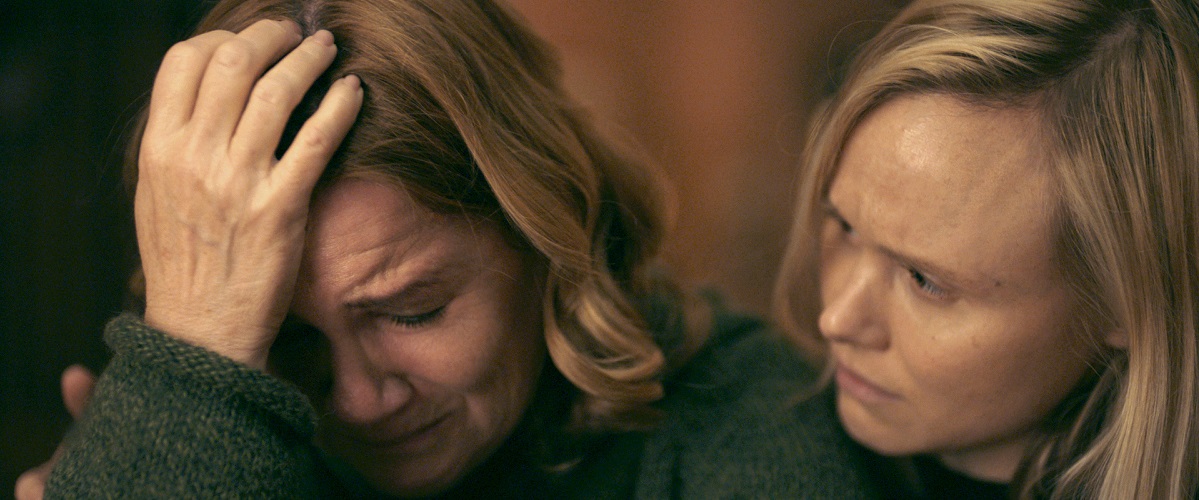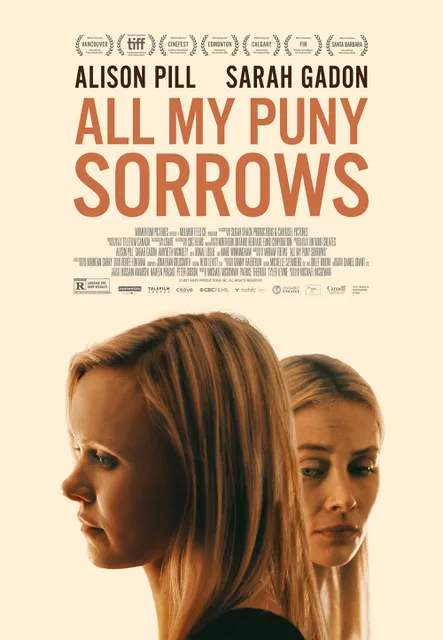“She wanted to die and I wanted her to live and we were enemies who loved each other.” This is how narrator Yolandi (“Yoli”) describes the conflict with her sister Elfrieda (“Elf“), in Miriam Toews’ celebrated novel All My Puny Sorrows, loosely based on events in Toews’ own life. Elf is a concert pianist who has attempted suicide multiple times. Yoli, a novelist, drops everything to tend to her sister in the psych ward, trying to convince Elf that life, painful as it is, is worth living. But Elf has one eye on oblivion at all times. To her, the siren call of death is louder than any concerto.
Toews’ book is a painful one, but it’s also funny, sharp-witted, giving a rich texture to this very specific Mennonite family and the ways they cope, endure, hold each other up (or not). Director Michael McGowan has adapted Toews’ book for the screen, and two powerful actresses—Sarah Gadon and Alison Pill—play the sisters. While the adaptation is, in many ways, quite skilled, the pace of “All My Puny Sorrows” is so stately, and the overall tone so reserved, that it results in an emotionally muted film. Everything seems to be happening underwater, and this runs counter to the overall subject of generational trauma, suicide, and mortality.
Elf and Yoli grew up in a close-knit and very controlling Mennonite community in Winnipeg. Their father Jake (Donal Logue), butted heads with the elders when he decided to let Elf study music in college. It caused a lot of friction in the traditional hierarchy. Jake ran up against similar resistance in his attempts to create a small library. Jake commits suicide soon after, and the family has lived in the aftershock of that event ever since. The girls’ mother, Lottie (Mare Winningham), is a strong and solid woman, who carried on alone, but is devastated at the heavy load her daughters have had to carry. She says to Yoli, point-blank, “You carry a lot of sadness, and for that I am sorry.”
When Elf ends up in the hospital after her second suicide attempt, Yoli flies in from Toronto to “circle the wagons.” Elf wants Yoli to help her get to Switzerland where there is a clinic known for assisted suicide. The banter between the sisters is sharp and sarcastic. The two of them are both well-read, and pepper their conversations with quotes from D.H. Lawrence or Paul Valéry. Elf’s suicide note quotes Philip Larkin’s haunting and eerie poem Days. The title of the book (and film) comes from Samuel Taylor Coleridge’s poem To a Friend, written for Charles Lamb, whose sister had fallen ill. Coleridge writes with empathy:
“I, too, a sister had, an only sister —
She loved me dearly, and I doted on her;
To her I pour’d forth all my puny sorrows.”
There are a lot of old and complicated family dynamics at play here: Elf was the perfect sister, Yoli the rebel who got pregnant at seventeen, etc. Elf’s husband Nic (Aly Mawji) seems supportive, but also fairly useless, and Elf’s psychiatrist is inclined to release her from the hospital. Yoli begs him not to.
The film opens with Donal Logue, standing on railroad tracks, staring at a train approaching, awaiting his own death, a death he chose. It’s an image McGowan comes back to again and again. “All My Puny Sorrows” is woven through with collage-like fragments of this moment and others, showing the past, the two sisters as children, the glimpses of their strong bond, the toys they played with, the woods they wandered through, their smiles. These collages create an associative and subjective mood, placing us in Yoli’s head, where memories intrude upon the present. Yoli’s voiceover is used so inconsistently it never solidifies into an actual choice. The film is clearly told from her point of view, but the voiceover adds next to no insight, and for long sections it falls away altogether.
Compare to a film like “‘night, Mother,” which has a similar theme: a mother tries to stop her daughter from killing herself. In that film, Anne Bancroft desperate pleading and Sissy Spacek’s practical certainty makes for an extremely unnerving watch. You hope the mother will succeed in convincing the daughter to stick around. But the daughter seems so determined, it feels like it’s too late. She’s already gone, really, it’s just that she needs to tie up some loose ends. Playing out in real time, “‘night, Mother” is devastating. “All My Puny Sorrows” has all the elements to pack a devastating punch, but there’s no real sense of urgency. It’s like people are just marking time, like the end has already been determined, it’s just a matter of resigning oneself to the inevitable.
The three actresses are wonderful—particularly Pill, who inhabits Yoli’s ragged insecurities with comfort and familiarity (bringing some welcome humor to this mostly glum affair). Yoli feels very real. The scenes with her daughter Nora (Amybeth McNulty) are some of the best in the film, quiet and insightful. Gadon is a wonderful actress, although here she mostly just lies in a hospital bed, staring off vaguely and sadly into the distance. There are moments when the heat is turned up underneath the characters—when Yoli tells Elf how much she will miss her, for example—but it’s never enough. The temperature remains lukewarm.
Now available on digital platforms.




















